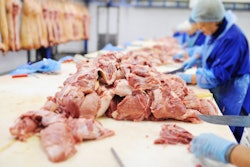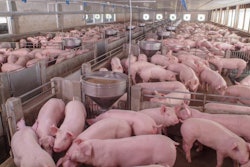
A clearer picture of the scale of pig losses from African swine fever (ASF) in the Philippines has emerged from a retrospective outbreak report.
In the region of Eastern Visayas in the Philippines, around 3,000 pigs have now been culled as a result of African swine fever (ASF), reports Philippine News Agency (PNA).
Affected have been animals in seven towns in the province of Leyte, where ASF first emerged in mid-January.
Local officials have been arranging for the culling of all pigs within 500 meters of a confirmed outbreak of the disease. Samples from approximately 300 pigs in the province were awaiting processing.
Meanwhile, on the island of Luzon, about 100 more pigs have been culled in the neighboring region of Bicol, according to PNA. Facing an imminent cull are 109 pigs in the town of Malinao, adding to the around 850 animals that have already been culled in Albay province.
The great majority of the province’s pigs are owned by backyard owners. Just 10% of the 60,000 pigs in the province are kept on commercial farms, according to a local official.
Over the past week, the country’s agriculture department has retrospectively registered 173 outbreaks of ASF to the World Organisation for Animal Health (OIE).
Directly impacting more than 84,000 pigs, these outbreaks occurred on the island of Luzon between February 19 and December 21, 2020. The peak period for these cases were the months of August and September 2020. All the affected herds are described as “backyard,” and ranged in size from two animals to one village herd of more than 5,300 pigs. Outbreaks were spread across 23 provinces of the island.
Based on reports supplied to the OIE, this latest information puts the total ASF outbreaks on Luzon since September 2019 at 600. More than 391,000 animals were lost to the disease through mortality or culling.
Swift response to re-emergence of ASF in Cambodia
Presence of the ASF virus has been discovered in pigs in Banteay Meanchey province in northwestern Cambodia, reports Khmer Times. The province shares a border with Thailand.
According to the agriculture ministry, the virus was detected in pigs illegally transported from Thailand. All pigs in the immediate area are to be culled, and border inspections will be strengthened. The authorities also called on slaughterhouses to obtain pigs only from registered farms.
The local pig farmers’ association has welcomed the authorities’ quick response to the present outbreak. In 2019, around 1,000 pigs in Cambodia died and a further 800 were culled after the introduction of ASF through unregulated imports from Vietnam.
According to the United Nations’ Food and Agriculture Organization (FAO), Cambodia’s agriculture ministry reported ASF outbreaks in five provinces during 2019. The OIE records that the ASF situation was subsequently resolved.
Hong Kong culls 3,000 pigs as a precaution
From a small initial outbreak in early February, ASF appears to be spreading in Hong Kong, reports South China Morning Post. Up to 3,000 pigs are to be culled at the farm in northern Hong Kong after some animals in a second house at the same premises tested positive for the virus earlier this week.
The agriculture department confirmed that the cull would be carried out as soon as possible, and that the owner of the pigs would be compensated. Samples taken at three more pig farms within three kilometers of the initial outbreak came back negative for the ASF virus.
According to this source, 38 licensed producers supply around 22% of the pig meat consumed in Hong Kong. Local traders do not expect the current outbreak to disrupt supplies significantly.
In May 2019, the discovery of ASF in imported pigs at a slaughterhouse led to the slaughter of 6,000 animals.
ASF was detected in Hong Kong-raised pigs for the first time this month. Initially, around 240 pigs were culled after a few animals tested positive for the virus in Yuen Long in the western New Territories.
Losses of South Korean wild boar pass 1,000
Over the past week, South Korea’s agriculture ministry has informed OIE that 15 more wild boar have tested positive for the ASF virus. All these animals were found in counties where previous cases have been reported in the northern provinces of Gyeonggi and Gangwon.
Latest cases bring the country’s total since the start of 2021 to 50.
The ASF virus was first detected in South Korea in September 2019. Since then, the wild boar population has been heavily impacted. As of January 31, FAO puts the number of wild boar affected by ASF in South Korea at 1,001.
Sporadic outbreaks continue in Indonesia
In recent months, local media have been reporting mortality of pigs in a number of areas of Indonesia, according to the FAO. Affected areas include North Sumatra, East Nusa Tenggara province, Sikka Regency, and the district of Nele.
OIE recorded the country’s first ASF outbreak in December 2019.
China lifts ASF restrictions in Guangdong province
Movement restrictions have been lifted around Pingyuan county in Guangdong province, reports China’s agriculture ministry.
In January, restrictions were put in place in the Meizhou city region after some illegally transported pigs tested positive for ASF at a highway checkpoint.
Looking ahead, pork demand is expected to rebound in most regions of the world. However, a new report forecasts that ASF and COVID-19 will to continue to affect global pig meat production in 2021.
View our continuing coverage of the global African swine fever situation.


















